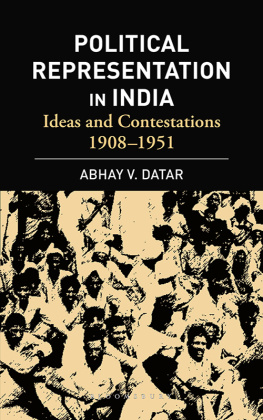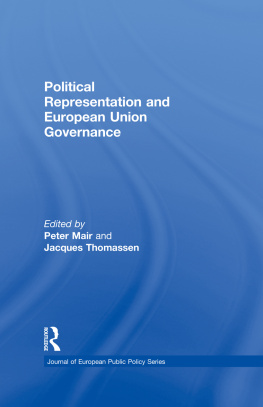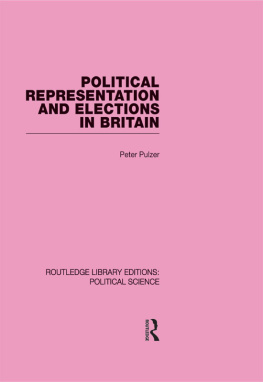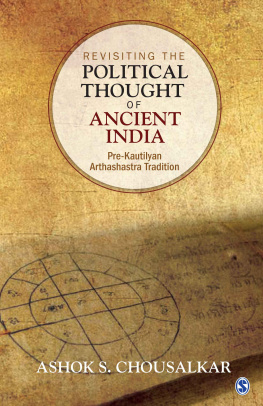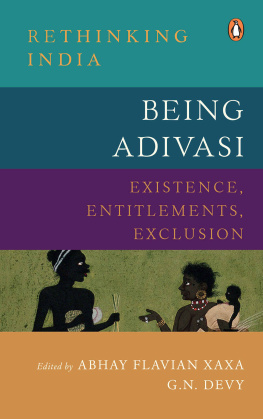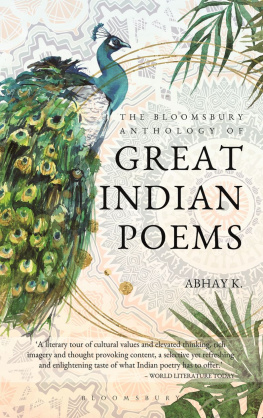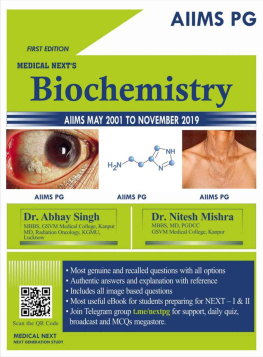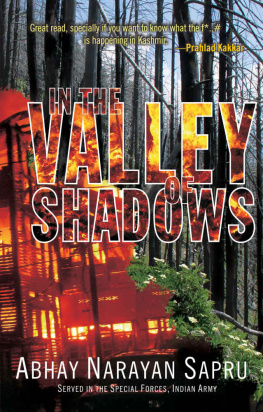Abhay V Datar - Political Representation In India: Ideas and Contestations, 1908-1951
Here you can read online Abhay V Datar - Political Representation In India: Ideas and Contestations, 1908-1951 full text of the book (entire story) in english for free. Download pdf and epub, get meaning, cover and reviews about this ebook. year: 2019, publisher: Bloomsbury India, genre: Politics. Description of the work, (preface) as well as reviews are available. Best literature library LitArk.com created for fans of good reading and offers a wide selection of genres:
Romance novel
Science fiction
Adventure
Detective
Science
History
Home and family
Prose
Art
Politics
Computer
Non-fiction
Religion
Business
Children
Humor
Choose a favorite category and find really read worthwhile books. Enjoy immersion in the world of imagination, feel the emotions of the characters or learn something new for yourself, make an fascinating discovery.
- Book:Political Representation In India: Ideas and Contestations, 1908-1951
- Author:
- Publisher:Bloomsbury India
- Genre:
- Year:2019
- Rating:5 / 5
- Favourites:Add to favourites
- Your mark:
- 100
- 1
- 2
- 3
- 4
- 5
Political Representation In India: Ideas and Contestations, 1908-1951: summary, description and annotation
We offer to read an annotation, description, summary or preface (depends on what the author of the book "Political Representation In India: Ideas and Contestations, 1908-1951" wrote himself). If you haven't found the necessary information about the book — write in the comments, we will try to find it.
Abhay V Datar: author's other books
Who wrote Political Representation In India: Ideas and Contestations, 1908-1951? Find out the surname, the name of the author of the book and a list of all author's works by series.
Political Representation In India: Ideas and Contestations, 1908-1951 — read online for free the complete book (whole text) full work
Below is the text of the book, divided by pages. System saving the place of the last page read, allows you to conveniently read the book "Political Representation In India: Ideas and Contestations, 1908-1951" online for free, without having to search again every time where you left off. Put a bookmark, and you can go to the page where you finished reading at any time.
Font size:
Interval:
Bookmark:

POLITICAL REPRESENTATION IN INDIA
POLITICAL
REPRESENTATION
IN INDIA
Ideas and Contestations
19081951
ABHAY V. DATAR

BLOOMSBURY INDIA
Bloomsbury Publishing India Pvt. Ltd
Second Floor, LSC Building No. 4, DDA Complex, Pocket C 6 & 7,
Vasant Kunj New Delhi 110070
BLOOMSBURY, BLOOMSBURY ACADEMIC INDIA and the Diana logo are trademarks of
Bloomsbury Publishing Plc
First published in India 2019
This edition published 2019
Copyright Abhay V. Datar, 2019
Abhay V Datar has asserted his right under the Indian Copyright Act to be identified as Author of this work
Bloomsbury Academic
An imprint of Bloomsbury Publishing Plc
All rights reserved. No part of this publication may be reproduced or transmitted in any form or by any means, electronic or mechanical, including photocopying, recording, or any information storage or retrieval system, without prior permission in writing from the publishers
Bloomsbury Publishing Plc does not have any control over, or responsibility for, any third-party websites referred to or in this book. All internet addresses given in this book were correct at the time of going to press. The author and publisher regret any inconvenience caused if addresses have changed or sites have ceased to exist, but can accept no responsibility for any such changes
ISBN: HB: 978-9-3882-7178-3; eBook: 978-9-3882-7179-0
2 4 6 8 10 9 7 5 3 1
Created by Manipal Digital Systems
Bloomsbury Publishing Plc makes every effort to ensure that the papers used in the manufacture of our books are natural, recyclable products made from wood grown in well-managed forests. Our manufacturing processes conform to the environmental regulations of the country of origin.
To find out more about our authors and books visit www.bloomsbury.com and sign up for our newsletters
Contents
This book is a revised version of the PhD dissertation that was completed under the supervision of Prof. Suhas Palshikar at the Department of Politics and Public Administration, Savitribai Phule Pune University, Pune. Any such work, though ostensibly the outcome of an individual researchers efforts, is actually in many ways a group activity and a result of a collective endeavour. Many people have contributed in myriad ways to the making of this thesis, and I consider it essential to thank each one of them.
First and foremost, I would like to thank Prof. Palshikar for not only agreeing to supervise a thesis on what was then a rather nebulous topic but encouraging me to pursue it. The numerous and wide-ranging discussions that I had with him have helped me to give a concrete shape to the thesis. His pointed and thought-provoking comments on the draft chapters have helped me hone my arguments and make them sharper.
While the thesis was being written, I joined the Peoples College, Nandedan institute with a long tradition of learning. I am indeed thankful to Dr V.N. Ingole, the then Principal of Peoples College, for continuously encouraging me and taking a keen interest in my research. My colleagues and friends in the Department of Political Science, Peoples College, particularly Dr Ashok Siddhewad and Dr Vishal Patange, have also helped me in many ways with the thesis. Friends from other departments, particularly Dr Shriniwas Pande, Dr Balaji Chirade, Dr Bajirao Wadawale, Dr Bhagwan Jadhav, Dr Mukund Kawade and Mr Ananda Thorat, among others, have also been of great help and assistance. Their cooperation and encouragement have ensured the completion of the thesis within the stipulated time.
The bulk of the material cited in the bibliography was consulted at the Dhananjayrao Gadgil Library of the Gokhale Institute of Economics and Politics, Pune. I am thankful to the librarian and the staff of the Institute for their assistance, without which the present work probably would have never been materialised in the first place. The facilities and the atmosphere provided by the Institute were indeed conducive to the research. Similarly, the staff of the Jaykar Library of the Savitribai Phule Pune University and the library of the Department of Politics and Public Administration have similarly been helpful. The library of the Peoples College, long nurtured by eminent scholars like Dr Surendra Barlingay, Dr K.R. Shirwadkar, Dr S.R. Gadgil, Principal Narhar Kurundkar and Dr P.S. Ghare, has been an important source of reference material. I am thankful to Mr Sandeep Gaikwad, the Librarian of the Peoples College, and his colleagues for their help.
I would also like to thank my friends at the Department of Politics and Public Administration, Savitribai Phule Pune University, namely Dr Shailendra Kharat, Babasaheb Munde, Pandurang Bhoye, Vivek Ghotale, Sominath Gholwe, Shivaji Motegaonkar, Sunil Kankate, Kishor Raktate, Namdev Pawar and Nitin Nipunge, for informally discussing the various aspects of the thesis and, on many occasions, helping me complete various formalities. The administrative staff of the Department has been uniformly helpful in smoothening out what could have been tedious paperwork.
It is a matter of deep regret that two of my revered teachers, Prof. Rajendra Vora and Prof. Yeshwant Sumant, are no longer with us. They would have certainly loved to read this work and would naturally have offered incisive comments, which would have certainly made the thesis a better one. Shravan Modak, who was a dear friend, also passed away while the research was underway. He had always been at the receiving end of whatever I wrote, and patiently lent his ears to many of my ideas. He often brought a refreshing perspective from outside academia to whichever issue was being discussed. Many of the topics in this work, of course, very nebulous then, were discussed with him over many cups of coffee. His expert eye would certainly have helped choose the right word to make my arguments stronger and sharper.
I would also like to thank my parents, Vijaykumar and Sushama Datar, and my grandmother, late Mrs Shanta Ranade, for their encouragement and support. Without them, this thesis would never have happened at all. My wife, Deepali, and parents-in-law, Suhas and Madhuri Bapat, have also supported me, and it also because of them that the thesis could be completed in time.
I would further like to thank Bloomsbury Publishing, India, for agreeing to publish this work and making all efforts to ensure qualitative improvements in it. It is indeed a pleasure to work with a reputed publishing house, whose very name reminds one of a remarkable group of individuals in the history of English literature.
This study seeks to explore the extensive and wide-ranging debates, marked by contestations as well as the emergence of numerous ideas, about political representation in colonial India and also during the process of constitution-making in India. These debates, hitherto overlooked, are significant, for they helped in shaping the institutional structures of political representation that Indian democracy possesses at present. Such an exploration might provide a tentative answer as to why and, perhaps less importantly, how post-independence India came to adopt these structures.
The starting point for this exploration would be the Indian Councils Act 1909, popularly known as the MorleyMinto Reforms, and the Government of India Act 1919, popularly known as the MontaguChelmsford reforms. This study would examine the discussions during the Round Table Conferences, over the Communal Award and the Government of India Act, 1935, as also the debates during the framing of the Indian Constitution. It would conclude with the discussion of the passage of the two Representation of Peoples Acts, those of 1950 and 1951. These events generated the debates in the first place. The Partition of India changed the political situation entirely, and with it, the very context within which the entire debate was taking place changed substantially. Yet, significant continuities remained. The treatment of this issue, however, would not be episodic but thematic.
Font size:
Interval:
Bookmark:
Similar books «Political Representation In India: Ideas and Contestations, 1908-1951»
Look at similar books to Political Representation In India: Ideas and Contestations, 1908-1951. We have selected literature similar in name and meaning in the hope of providing readers with more options to find new, interesting, not yet read works.
Discussion, reviews of the book Political Representation In India: Ideas and Contestations, 1908-1951 and just readers' own opinions. Leave your comments, write what you think about the work, its meaning or the main characters. Specify what exactly you liked and what you didn't like, and why you think so.

